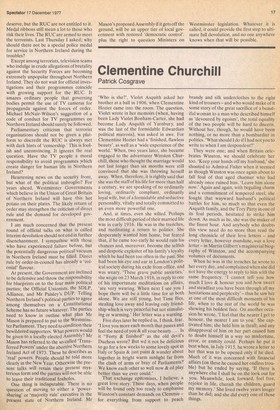Clementine Churchill
Patrick Cosgrave
'Who is she?', Violet Asquith asked her brother at a ball in 1906, when Clementine Hozier came into the room. The question, Violet wrote in her memoirs (when, having been Lady Violet Bonham-Carter, she had become Lady Asquith of Yarnbury, and was the last of the formidable Edwardian political matrons), was asked in awe. For Clementine Hozier had a 'finished, flawless beauty', as well as a 'wide experience of the world.' When, two years later, she became engaged to the adventurer Winston Churchill, those who thought the marriage would not last longer than six months were still convinced that she was throwing herself away. When, therefore, it is rightly said that she was the staff of his life for more than half a century, we are speaking of no ordinarily loving, ordinarily compliant, ordinarily loyal wife, but of a formidable and seductive personality, vitally and totally committed to an even more powerful one.
And, at times, even she wilted. Perhaps the most difficult period of their married life was in early 1916. He was in the trenches, and meditating a return to politics. She desperately wanted him home, but feared that, if he came too early he would ruin his chances and, moreover, become the selfish and despotic exploiter of his family's loyalty which he had been too often in the past. She had been his eye and ear in London's political society during his exile from office, and was weary. 'These grave public anxieties,' she wrgte on 23 March 1916, in reply to one of his importunate meditations on affairs, 'are very wearing. When next I see you I hope there will be a little time for is both alone. We are still young, but Time flies, stealing love away and leaving only friendship which is very peaceful but not stimulating or warming.' Her letter was a warning.
Five days later he replied in, I think, fear. 'I love you more each month that passes and feel the need of you & all your beauty.. . . IS it "Forty & finished" as the old devil's Duchess wrote? But wd it not be delicious to go for a few weeks to some lovely spot in Italy or Spain & just paint & wander about together in bright warm sunlight far from the clash of arms or bray of Parliaments? We know each other so well now & cd play better than we ever could.'
That exchange epitomises, I believe, a great love story. These days, when people will be found only too ready to emphasise Winston's constant demands on Clemmie — for everything from support to peach brandy and silk underclothes to the right kind of trousers — and who would make of it some story of the great sacrifice of a beautiful woman to a man who described himself as 'devoured by egoism', the total equality of the two people will be hard to discern. Without her, though, he would have been nothing, or no more than a bombardier in politics. 'What should I do if! had not you to write to when I am despondent?'
They were one; and when Britain celebrates Winston, we should celebrate her too. 'Keep your hands off my husband,' she shouted to Admiral Fisher when it seemed as though Winston was once again about to fall foul of that aged charmer who had already once ruined him. 'Leave him alone now.' Again and again, with beguiling charm and a commitment of tempered steel, she fought that wayward husband's political battles for him, so much so that even the Asquith family, and the Tory Party in one of its foul periods, hesitated to strike him down. As much as he, she was the maker of the finest hour. And anybody who doubts this view need do no more than read the long chronicle of their love letters — and every letter, however mundane, was a love letter in Martin Gilbert's magisterial biography of Winston, and the accompanying volumes of documents.
When he was in the trenches he wrote to her every day, and complained when she did not have the energy to reply to him with the same frequency. 'I cannot tell you how. much I love & honour you and how sweet and steadfast you have been through all my hesitations and perplexity' — thus he saw her at one of the most difficult moments of his life, when to the rest of the world he was showing his boldest face. On another occasion he wrote, 'I feel that the nearer I get to honour, the nearer I am to you.' She captivated him; she held himin thrall; and any disapproval of him on her part caused him to doubt himself in a way no misfortune, error, or enmity could. Perhaps he put it best when, in July 1915, he wrote a letter to her that was to be opened only if he died. Much of it was concerned with financial affairs (on these he caused her endless trouble) but he ended by saying, 'If there is anywhere else I shall be on the look out for you. Meanwhile, look forward, feel free, rejoice in life, cherish the children, guard my memory.' She lived twelve years longer than he did; and she did ever' one of those things.


































 Previous page
Previous page